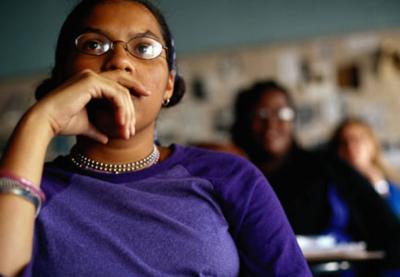I never really expected the Golden Globes to offer me a teachable moment, but it did. Women, dressed almost exclusively in black, spoke with passion and eloquence about restorative justice and “speaking out without the fear of retribution.” They spoke almost in unison about the systemic sexual abuse entrenched in our society and how social movements like #MeToo can help facilitate change.
Men, a few wearing pins reading “Time’s Up” on their lapels, said virtually nothing about the biggest theme of the night. For the most part, they went about business as usual, seemingly unwilling or incapable of using their powerful voices to discuss the issue taking the spotlight. Why aren’t they talking about this? I found myself asking. What should they say be saying if they did speak?
Over the past couple of days, I have been asking my students those questions. Their answers offer some insight into the complexities of advocacy and how we as educators might help empower our students to combat injustices they see, even—or especially—when those injustices don’t directly affect them.
“It’s a women’s issue” was a popular response among boys. “They don’t want to say anything because they are hiding their own assaults and harassment” was popular among the girls. Quickly it became evident that my students were divided along the same lines as that fancy ballroom full of movie stars, directors and producers. The conversation was rapidly leaning toward a dynamic of us versus them.
Many of the students seemed to believe that, in order to speak out about sexual harassment and assault, one must be a woman and/or a survivor. Some, in attempts to clarify those ideas, made connections to the Black Lives Matter movement, which they identified as a movement that white people couldn’t effectively speak out about.
“It is like that Macklemore song,” one student interjected. I know the song, “A Wake,” and pull up the lyrics on my phone: “And my subconscious telling me stop it/ This is an issue that you shouldn't get involved in/ Don't even tweet ‘R.I.P Trayvon Martin’/ Don't wanna be that white dude million-man marching/ Fighting for a freedom that my people stole.” Another student quickly pointed out that Macklemore is talking about race and sexual orientation even though he is white and straight; he is using his platform and his voice to influence change.
This idea of ownership kept coming up throughout our discussions. Many students felt that only people directly affected by sexual exploitation could rally behind a campaign to change it. They thought it was disingenuous or fraudulent to fight for a cause that wasn’t “theirs.” Others challenged that idea and pushed their peers to see that those with historical power must raise their voices in support of those trying to gain equal footing.
From there, we shifted to another challenge: not knowing what to do or what to say. The students in my classes, especially boys who had never been on the receiving end of a sexually degrading comment or sexually predatory act, were unsure what to say on the subject. We brainstormed this for a few minutes, first writing down ideas and then discussing what the men at the awards could have said.
“Sorry,” one student volunteered. “They could start by simply saying they are sorry that this has continued for so long, sorry that they heard talk about it or actually witnessed it and didn’t do anything.” Another student took it a step further by suggesting the men could have made a pledge to never look the other way again, but instead challenge sexually exploitative behavior. And still another thought the men’s silence was a good thing. “Maybe they should just keep quiet and let the women talk. Maybe it is their turn.”
From there, some students made connections to their own lives, transitioning from Hollywood to our own hallways. Several drew connections to the anti-bullying campaign our school has run for years now encouraging students to be “Upstanders rather than Bystanders.”
“It is the same thing for sure,” one student said passionately. “How many times have you heard a guy say, ‘Nice ass’ and let it go without calling him out?” Lots of heads nodded.
Of course, this conversation is just the beginning, but the Golden Globes offered a good segue into a discussion of the roles we can play in helping people fight for a cause that might not immediately affect us. Perhaps more than any lesson, I want my students to see the ways in which we are all connected in these struggles.
I am hoping to make 2018 the year of advocacy in my classroom. In two decades of teaching, I have never seen so many opportunities to tap into popular culture and teach students about advocacy—public and active support for a cause or course of action.
#TakeAKnee, #BlackLivesMatter, #MeToo. We’re surrounded by opportunities to teach our students a crucial lesson: An injustice does not need to touch you directly for you to speak out against it.
Knoll is a writer and English teacher at a public school in New Jersey.
